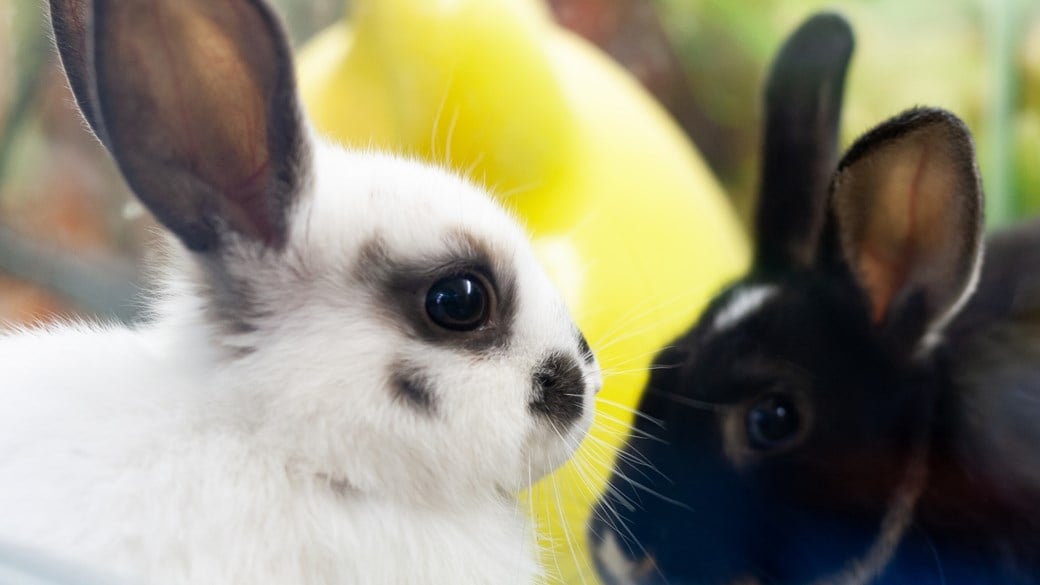
Rabbit Vaccinations
There are some nasty viruses out there that threaten pet rabbits; these include myxomatosis and both strains of rabbit haemorrhagic disease 1 & 2 (RHD1 & RHD2).
Fortunately, your bunny can be safeguarded against life-threatening diseases with an annual vaccination - by getting an injection against these diseases every year, you know your rabbit is up-to-date with the very best protection.
Vaccinations are quick and simple, and before your bunny is vaccinated they will also receive a full health assessment. This is a vital opportunity for the vet to detect any visible health problems which may be developing, to discuss any concerns you may have about your pet, and to make sure you have all the information on the best care for your rabbit.
Keeping your annual vaccination appointment every year is really important for both you and your rabbit. If you would like any more information on vaccinating your rabbit, get in touch with your local Vets4Pets practice.
Do Rabbits need vaccinations?
While it's not the law to vaccinate pet rabbits, we strongly advise vaccinating your rabbit to protect them against sometimes fatal diseases. Keeping your annual vaccination appointment every year is really important for both you and your rabbit.
If you would like any more information on vaccinating your rabbit, get in touch with your local Vets4Pets practice.
Vaccinating Rabbits
As a general rule, your rabbit can be vaccinated from seven weeks old with the combined Myxomatosis RHD Plus vaccine and immunity takes three weeks to develop. This vaccination gives protection against the three main rabbit diseases - Myxomatosis, Rabbit Haemorrhagic Disease 1 (RHD1) and Rabbit Haemorrhagic Disease 2 (RHD2). Historically two separate vaccinations were needed, but there is now a single vaccine available.
To keep their immunity topped up rabbits will need a yearly booster vaccination.
If you are not sure if your rabbit has been vaccinated, or you know they have not been vaccinated then getting your rabbit in for their vaccination appointment is a priority. Speak to your vet to discuss your rabbits vaccination plan.
A rabbit vaccination appointment is much more than a quick injection for your rabbit – it is you and your vet’s chance to really see how your rabbit has been doing. Your rabbit will be weighed, and have a thorough medical exam – this will include areas you cannot see at home, such as the back teeth. Your vet will probably ask you lots of questions about how your pet has been behaving, about any changes, and about specific topics such as their eating and drinking habits. Your vet is trained to spot subtle changes, helping any developing issues be managed as soon as possible. Your vet will also listen to any concerns you may have, and help you manage these.
As well as the thorough exam, your vet will administer the rabbit with its vaccination. This is given under the skin at the back of the neck, and is well tolerated by the vast majority of rabbits.
Myxomatosis is a highly infectious and usually fatal virus that is transmitted by mosquitoes, fleas or by close contact with an infected rabbit. Myxomatosis kills many rabbits in the UK every year, and all rabbits are susceptible whether kept indoors or outdoors.
Signs of myxomatosis in rabbits include:
- Red swollen eyes
- Conjunctivitis
- Fever
- Loss of appetite
- Lethargy
An unvaccinated rabbit surviving a myxomatosis infection is very unusual. There is no specific treatment for the virus, and sadly only supportive care such as fluids and antibiotics can be provided to help ease the pain and discomfort. As supportive care is so rarely successful in myxomatosis cases, euthanasia is usually recommended.
Whilst there is a very small chance that a vaccinated rabbit can still develop myxomatosis, the disease in this instance is far less severe and has a much higher chance of successful treatment.
(Rabbit Haemorrhagic Disease)
Rabbit Haemorrhagic Disease is also known as Rabbit Viral Haemorrhagic Disease and has several acronyms: RHD, RVHD, VHD and RHD1. This virus is extremely contagious and sadly once a rabbit is infected it is almost always fatal.
Signs are often difficult to detect because RHD can kill a rabbit very quickly, which is why any sudden rabbit death should be regarded as suspicious.
RHD causes bleeding to the internal organs of the rabbit so if signs are seen these can include:
- A fever
- Loss of appetite
- Lethargy
- Difficulty breathing
- Blood stained discharge from the nose or mouth
- Seizures (fits)
The RHD virus is very resistant and can remain active in the environment for many months. It can be transmitted through both direct and indirect contact. Transmission is quick and does not require prolonged contact; an infected rabbit can pass the virus directly to another by nose to nose contact or via food bowls, bedding, urine and faeces.
Insects, birds & rodents can all spread these diseases to rabbits and humans can carry the virus on their clothes if they have been in contact with infected rabbits.
There is a second strain of Rabbit Haemorrhagic Disease, often referred to as RHD2.
RHD2 has some differences from RHD1, but the virus is still associated with severe internal bleeding, and rapid death in many cases and can remain active in the environment for a long time.
The RHD2 disease is seen across the UK and vaccinating rabbits against this condition is extremely important.
Rabbit Advice
Read more of our expert rabbit advice to keep your rabbit happy and healthy.
